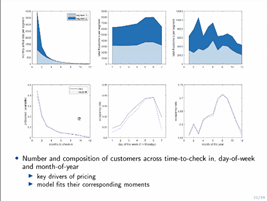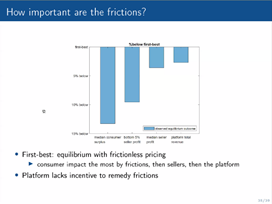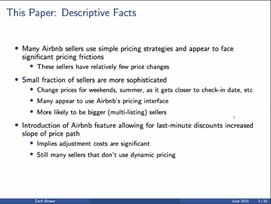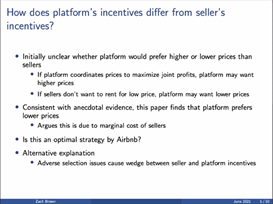
On the morning of June 16, the second session of the 2021 Shanghai University of Finance and Economics -Jinan Industrial Organization Webinar was held. Professor Yufeng Huang from Simon Business School of the University of Rochester presented a new research paper entitled “Seller-Pricing Frictions and Platform Remedies”, on which professor Zach Brown of the University of Michigan commented.
Abstract of the paper
Taking Airbnb as an example, the author analyzed the problem of sellers’ insufficient price adjustment under the dynamic market environment and evaluated the effect on the market equilibrium by constructing structural models and using the listing data of Airbnb. In the Airbnb rental market, the main pricing problems encountered by Airbnb sellers include: 1. The product differentiation is obvious, the price of homestay is different according to locations and needs to be fixed separately; 2.Market demand varies from time to time (for example, rooms are quickly sold out during the peak season), requiring highly flexible pricing based on market conditions. To solve this problem and help sellers maximize their profits, Airbnb offered a simple pricing adjustment interface and automated pricing algorithms for sellers to use. But the percentage of sellers using the algorithm has not increased significantly because the platform’s automated pricing tends to be low.


To explain this phenomenon, the authors used monthly listing data for all Airbnb properties in California since 2015, and constructed a structural model to study the pricing decisions of heterogeneous Airbnb sellers in a platform-design environment. The paper measured the degree of seller’s pricing friction, used the natural changes in pricing interface design to distinguish the different sources of pricing friction, and discussed the two basic mechanisms behind pricing friction. Meanwhile, it quantified the loss of consumers, sellers and platform earnings due to pricing friction, and simulates the effect of platform recovery strategy by using counterfactual analysis.
The study found that only about 15 percent of Airbnb sellers do not have significant price adjustment costs, and that up to 50 percent of Airbnb sellers have so high friction that they never adjust their rental prices. The main reason for friction is the seller’s price adjustment cost and its cognitive constraints, and the counterfactual analysis shows that the marginal cost of the seller is the main reason for the misalignment between the seller and the platform. As a result, for the platform, its pricing algorithms help ease pricing friction and steer sellers toward desirable outcomes in favor of the platform and consumers.
Comment


Zach Brown, a professor from the Department of Economics at the University of Michigan, commented on the paper and offered constructive suggestions. He reviewed the descriptive facts and structural model of the paper and discussed the following three research issues:
1. What is the difference between platform incentive and seller incentive? The paper shows that platforms prefer low prices, mainly because of the marginal cost of the seller, but whether there is another explanation, that is, it may be reverse selection that leads to the difference between the seller and the platform incentive;
2. The modeling problem of diversified pricing frictions: Is there a way to nest multiple pricing frictions into a single pricing model?
3. The application of third-party pricing algorithm: this algorithm has a wide range of application in Amazon, eBay and gas stations. Can this tool achieve the optimal solution?
In the end, the reviewer concluded that the paper made an important contribution to the measurement of pricing frictions and the importance of pricing techniques to online platforms, and the conclusion of the paper also provides a certain method in the aspect of anti-monopoly case examination and supervision.
The seminar attracted more than 100 scholars and experts in the field of industrial organization at home and abroad to participate in the discussion.

